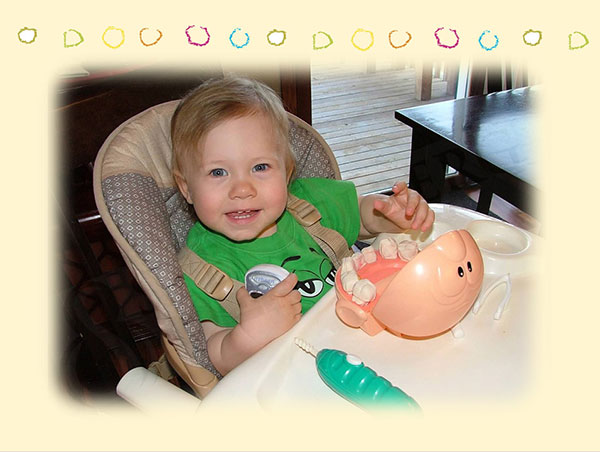
One great way to help your child feel comfortable at our office, is to “play dentist” at home. When you brush your child’s teeth, some great things to say are: “now I am going to pretend to be the dentist. I am brushing your teeth, (you can sing a little song, if you like). Let me practice my counting… 1, 2, 3, 4…. Your teeth are so sparkly clean. Good job! Now it is your turn to brush. Let’s work on brushing in little circles.” Feel free to ask Dr. Steckelberg for pointers at your next visit.
When playing dentist, I do have a request. Make sure to talk about the fun parts. The dentist will brush your teeth. How many teeth do you have? Do you think mommy has the same number of teeth as you? Dr. Steckelberg will count your teeth just like we count your fingers and toes: 1, 2, 3, 4…. Maybe the dentist will count your teeth by letters… Is that silly? A, B, C, D…..
Well, guess what! The first set of teeth (primary or baby teeth) are labeled with letters, actually. The primary teeth are labeled from A to T; but these teeth do not erupt in alphabetical order! Typically, the first teeth to erupt are teeth O and P (mandibular incisors – front and center on the lower jaw). The second set of teeth are labeled with numbers, from 1-32. If someone has extra permanent teeth, they get a number AND a letter. For example, someone with an extra wisdom tooth would have teeth…. 30, 31, 32, 32A.
When having your conversation about the dentist, I would recommend avoiding the following words: scary, shot, needle, pain, hurt, etc. These are what I would call the “four letter words of dentistry.” Asking a child, “does that hurt?” or “was that scary?” is not usually helpful. Children take their cues from adults. So, if we are asking them if it hurt or was it scary (especially in the moment), a child will usually get scared or think it hurts. Children can tell when their parents or guardians are anxious about something – they know you. If going to the dentist gives you anxiety, the adult will want to find a way to check that worry at the door. Otherwise, you will likely pass your dental anxiety on to your child. It is hard, but taking a deep breath and focusing on something other than the dental visit may help. If you have questions or concerns, please do not hesitate to ask us.
Dr. Steckelberg recommends parent involvement in brushing until age 8 or when they can tie their shoelaces independently and follow two-part instructions. Most children need reminders to “keep brushing” or “you have not brushed the right side yet,” until age 8. This will help your child have more success at brushing and a happier, healthier smile for a lifetime.
The American Dental Association helps promote good oral health all year long. During the month of February, we celebrate National Children’s Dental Health month. The 2018 theme is “Brush your teeth with fluoride toothpaste and clean between your teeth for a healthy smile”.
~Dr. Melanie Steckelberg